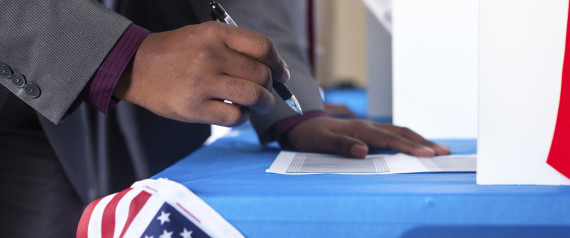Next week marks the 49th anniversary of the signing of the landmark civil rights statute, the monumental Voting Rights Act of 1965 (VRA). A cornerstone of the civil rights movement, the Voting Rights Act ensures that every American citizen, regardless of race or language, has equal access to the vote. That is until last June, when the U.S. Supreme Court gutted a key part of the Voting Rights Act, leading to a full-frontal attack on the voting rights of all Americans. With no legislative fix passed in the past year, voting rights remain at risk today.
Voter discrimination cannot be tolerated in the 21st century, and we will not remain silent as the voting rights of Americans everywhere are at risk. That's why we're pushing Congress to pass the Voting Rights Amendment Act, a flexible, modern answer to the problem of discrimination in voting.
Introduced in Congress by bipartisan co-sponsors earlier this year, the Voting Rights Amendment Act (VRAA) is a workable, commonsense solution that would modernize the elections process and protect the voting rights of all Americans. League members across the country have urged Congress to pass the Voting Rights Amendment Act, and praised the legislations' bipartisan supporters for putting aside politics to govern. Yet while the Senate has held a hearing on the legislation, the House of Representatives has yet to act. Every day that Congress fails to pass this critical legislation, Americans are in danger of increased barriers to the polls in their states and jurisdictions.
There is no right more fundamental to our democracy than the right to vote. Along with fellow voting and civil rights groups, the League of Women Voters refuses to be silent. We're asking voters everywhere to join us in urging their Representative to protect voters and move the Voting Rights Amendment Act forward. Even during Congress's August recess, the League, together with our partners and advocates, will make it clear that the right to vote is fundamental to our democracy, and our members of Congress must act to protect voters. As citizens, constituents and voters, it is up to us to make sure that our representatives know that we will not stand idle in the face of voter suppression.
When President Lyndon B. Johnson signed the Voting Rights Act into law on August 6, 1965, he called the day ''a triumph for freedom." "Millions of Americans are denied the right to vote because of their color," he said. "... [T]he time for injustice has gone." Our nation has taken great strides in advancing equality since President Johnson spoke these words. But voter discrimination still exists today, and minority voices are still being silenced. We must pass the Voting Rights Amendment Act and equip our democracy to respond to present-day barriers at the ballot box.
The civil rights activists who helped pass the Voting Rights Act 49 years ago left our country with a legacy of strength and bravery in the fight for equal rights for all. Now is the time to build on that legacy through modern, 21st century protections. The problem isn't complicated. Access to the vote is not about politics; it's about justice and equality. The VRAA will help ensure both. Tell Congress it's time to close the floodgates on voter suppression efforts.
